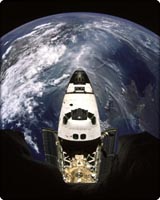Optimistic weather forecast for Wednesday's space shuttle launch
Even though Tropical Storm Ernesto and a lightning strike postponed the lift off of the space shuttle, the delay of a week may give NASA managers good weather for launching Atlantis, officials said Monday.

There was only a 20 percent chance that weather would prohibit Atlantis from blasting off at the 12:28 p.m. EDT (1628 GMT) Wednesday launch time, said Kathy Winters, shuttle weather officer.
A major reason for the optimistic forecast, which was better than the predicted weather at last week's planned launch attempts, is that the launch window on Wednesday opens before Florida's habitual summer afternoon thunderstorms blow through.
A tropical depression brewing in the Atlantic was not expected to affect the launch.
"The launch time is early ... as opposed to the last launch attempts we were looking at," Winters said. "Because of that, our afternoon thunderstorms development will occur after launch time."
Atlantis originally was scheduled to blast off Aug. 27 on a mission to resume construction on the international space station, but NASA delayed the launch attempt so that engineers could test the shuttle for any possible damage from a lightning strike at the launch pad. The strike didn't hit the spacecraft.
With Ernesto approaching, NASA managers last Tuesday ordered the shuttle returned indoors to an assembly building. Midway through the four-mile (6 1/2-kilometers) journey, managers reversed themselves and decided once Ernesto's intensity was downgraded to return the shuttle to the launch pad. The reversal gave NASA an opportunity to launch this week, rather than next month.
If Atlantis doesn't lift off on Wednesday, NASA will try again on Thursday and most likely on Friday.
"If you go back a week, it looked like we were not going to be able to have a launch attempt in September," said Robbie Ashley, the mission's payload manager. "So we're very thankful to the shuttle folks for carving out these three days of launch attempts and giving us another shot in September."
Atlantis' six astronauts have the complicated job of restarting space station construction which was stopped after the Columbia disaster in 2003. Crew members, who have been training for four years, will deliver a 35,000-pound (15,750-kilogram), $372 million (Ђ289.45 million) addition to the half-built international station during an 11-day mission that includes three spacewalks.
Engineers were tracking no technical issues with Atlantis, said Jeff Spaulding, a NASA test director.
"Atlantis and her crew have been waiting for several years to complete this mission. Thanks to Ernesto they've had to wait a week longer or so," Spaulding said. "But I'm pleased to announce that that wait is almost over and we'll be ready Wednesday," reports AP.
Subscribe to Pravda.Ru Telegram channel, Facebook, RSS!





